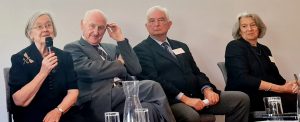Stephen Martineau is Research Fellow at the NIHR Policy Research Unit in Health and Social Care Workforce, King’s College London. (1,115 words)
 At the British Academy earlier this month, Dr Camillia Kong (Birkbeck College) and colleagues presented their end-of-project findings on the place of values and participation in mental capacity law. As well as contributions from the research team, the day featured a group of international experts, three Speak Out Leaders from VoiceAbility, and it culminated in a panel made up of four senior former judges: Baroness Hale of Richmond, Sir Mark Hedley, Senior Judge Denzil Lush, and District Judge Margaret Glentworth.
At the British Academy earlier this month, Dr Camillia Kong (Birkbeck College) and colleagues presented their end-of-project findings on the place of values and participation in mental capacity law. As well as contributions from the research team, the day featured a group of international experts, three Speak Out Leaders from VoiceAbility, and it culminated in a panel made up of four senior former judges: Baroness Hale of Richmond, Sir Mark Hedley, Senior Judge Denzil Lush, and District Judge Margaret Glentworth.
Participation and values
The event coincided with the launch of the second of two films produced by the project. The first, from 2021, had addressed the importance of good communication with the person at the centre of Court of Protection proceedings and discussed some of the ways of enabling their involvement (see particularly the ‘role-play’ at about 22 mins in). Three contributors in the film, Speak Out Leaders from VoiceAbility, took part in a panel at the event. The new film, Making Values Matter in the Court of Protection, includes a remarkable ‘demonstration’ of the exploration of a person’s values by a barrister engaging with the person and their father (from about 9 mins in). By modelling one way that requirements in the best interests checklist in s.4 Mental Capacity Act 2005 can be met, it provides a corrective to any notion that a finding of incapacity in respect of a decision amounts to an ‘off-switch’ for a person’s rights and freedoms.*
The main empirical paper to come out of the project is a rich consideration of the values of professionals in this sphere. It reports on interviews with 44 legal practitioners and 12 retired judges with experience of mental capacity law from across England and Wales. Among other things, the authors describe some of the tendencies that might work against best practice when it comes to s.4—pigeonholing people based on their diagnosis, for example, or according to their age. One legal practitioner, quoted in the article, said:
“You see the age of the person, because you see 1930-something, or sometimes 1920, and you’re, like, ‘Oh …’ I’ve seen people look at papers and say, ‘1920, 1930. Dementia. Well, they’re not going anywhere. It’s clearly a care home case for life. This is going to be an open and shut case. Why do we have to have any exploration about what this person is saying?’, notwithstanding that this person is headbutting a wall, wanting to leave, packing their bags, crying, saying, ‘Please, somebody, listen to me.’ ”
As was pointed out from the floor, it is also important to bear in mind how such tendencies can insinuate themselves into the assessment process, not just the best interests determination. Concerns of this type are relevant to HSCWRU’s ongoing study of self-neglect and hoarding among older people, which involves interviews with social care and other practitioners. Camillia Kong and her colleagues’ article and the second film from the project both emphasise the importance of professionals being aware, as far as is possible, of their own values and the effect these may have on their practice (that is to say, reflexivity).
Values and indeterminacy
The project has also addressed the conceptual context in which MCA practice takes place. At the start of the event, Dr Kong highlighted the ‘indeterminacy’ of the legal framework in which these professionals work. This was something addressed in one of the project’s theoretical papers in relation to s.4 MCA. As Sir Mark Hedley was to point out on the final panel, this section of the Act has no answers as to what a person’s best interests are, and although it provides the well-known checklist of considerations (including the person’s beliefs and values that would be likely to influence their decision if they had capacity), there is no hierarchy of significance ascribed to the items on the list, and the list is expressly non-exhaustive. Sir Mark noted that the section obliges the best interests decision-maker to ‘consider all the relevant circumstances’ and that these are defined at s.4(11) as those circumstances ‘of which the person making the determination is aware, and…which it would be reasonable to regard as relevant.’—a remarkably broad formulation, he suggested. Or a case of ‘fling wide the gates’ as he put it.
The wider context for this predicament of indeterminacy was elaborated on by co-investigator on the study, Prof John Coggon (University of Bristol). Drawing on the same theoretical paper, he described the MCA as ‘framework legislation with principles at its core’. Such is the MCA’s emphasis on each particular person and their differing circumstances, the lack of specificity in the Act and prominent reliance on the principles in s.1 are seen as fitting attributes.
Part of the picture here is also the fact that judgments of the Court of Protection are not moored to the doctrine of judicial precedent. Again, this has to do with the highly fact-specific nature of cases at the court. As the Court of Appeal said in relation to Part 1 of the MCA:
‘…it is helpful to look sideways and see how the courts have applied those statutory provisions to other factual scenarios. This has nothing to do with either the doctrine of precedent or the principles of statutory interpretation. The purpose is simply to see how other judicial decisions have exposed the issues or attempted to reconcile the irreconcilable.’ RB v Brighton and Hove City Council [2014] EWCA Civ 561, para 40.

Baroness Brenda Hale of Richmond, Sir Mark Hedley, Senior Judge Denzil Lush and District Judge Margaret Glentworth. (Photo courtesy of the project team)
The final panel of senior former judges had been asked to respond to the project’s empirical paper mentioned above. Hopefully, their fascinating and wide-ranging remarks will have been properly recorded. I will pick out just a couple of things from my notes. Senior Judge Denzil Lush pointed out that we are approaching the 700th anniversary of a foundational statute in this area, the De Prerogativa Regis of 1324. Baroness Hale said that though she had a major role in the development of the MCA (in the Law Commission of the 1990s) she had never served as a first instance judge within the jurisdiction set up by the Act. Tangentially, she observed that while the person’s values were an integral part of the best interests checklist in s.4, it was interesting that in s.1(3) Children Act 1989, while the wishes and feelings of the child are to be taken into account, ‘values’ are absent. And Sir Mark Hedley (whose book was strongly recommended at the event) highlighted the interplay of values in court between the person, their family and health and care professionals, and the importance, as a judge, of acknowledging the role of one’s own values in making decisions in the court on behalf of the person concerned.
The project, Judging Values And Participation In Mental Capacity Law, is funded by the Arts & Humanities Research Council. The project on Twitter.
Referred to in this post
Coggon, J., & Kong, C. (2021) From best interests to better interests? Values, unwisdom and objectivity in mental capacity law, The Cambridge Law Journal, 80(2), 245-273. https://doi.org/10.1017/S0008197321000283
Communication and Participation in the Court of Protection (Penny Cooper and colleagues, 30 mins) (2021)
Hedley, M. (2016) The Modern Judge: Power, Responsibility and Society’s Expectations, Bristol: LexisNexis.
Kong, C., Stickler, R., Cooper, P., Watkins, M., & Dunn, M. (2022) The ‘human element’ in the social space of the courtroom: Framing and shaping the deliberative process in mental capacity law, Legal Studies, 1-20. https://doi.org/10.1017/lst.2022.19
Making Values Matter in the Court of Protection (Penny Cooper and colleagues, 33 mins) (2022)
RB v Brighton and Hove City Council [2014] EWCA Civ 561
* “once incapacity is established so that a best interests decision must be made, there is no theoretical limit to the weight or lack of weight that should be given to the person’s wishes and feelings, beliefs and values.
[…]
“a conclusion that a person lacks decision-making capacity is not an ‘off-switch’ for his rights and freedoms. To state the obvious, the wishes and feelings, beliefs and values of people with a mental disability are as important to them as they are to anyone else, and may even be more important. It would therefore be wrong in principle to apply any automatic discount to their point of view.” (Peter Jackson J in Wye Valley NHS Trust v Mr B, [2015] EWCOP 60, paras 10-11)
—————————
This blog was written as part of an independent research project funded by the National Institute for Health and Care Research (NIHR) School for Social Care Research (NIHR SSCR). The views expressed are those of the author and not necessarily those of the NIHR SSCR, NIHR or Department of Health and Social Care.
Social care responses to self-neglect and hoarding among older people: What works in practice? (NIHR School for Social Care Research study at the NIHR Policy Research Unit in Health and Social Care Workforce)